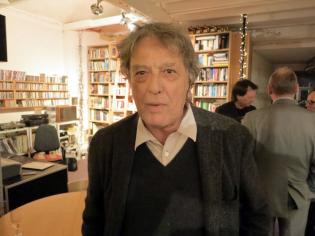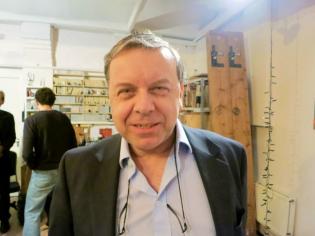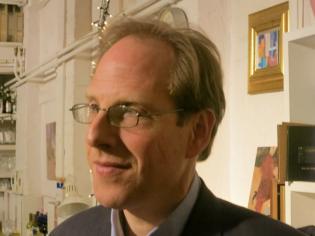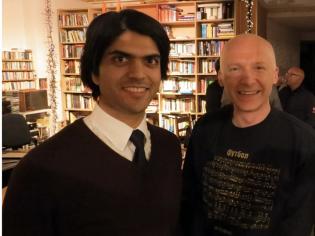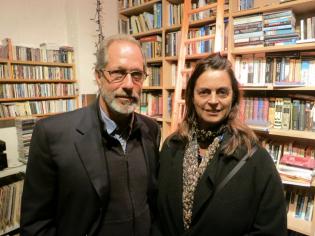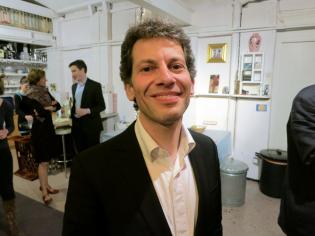TESTOSTERONE ON MY MIND AND IN MY BRAIN

This is a hormone that has fascinated me. It's a small molecule that seems to be doing remarkable things. The variation we see in this hormone comes from a number of different sources. One of those sources is genes; many different genes can influence how much testosterone each of us produces, and I just wanted to share with you my fascination with this hormone, because it's helping us take the science of sex differences one step further, to try to understand not whether there are sex differences, but what are the roots of those sex differences? Where are they springing from? And along the way we’re also hoping that this is going to teach us something about those neuro-developmental conditions like autism, like delayed language development, which seem to disproportionately affect boys more than girls, and potentially help us understand the causes of those conditions.
Introduction by John Brockman
"I thoroughly enjoyed the evening last week," emailed Brian Eno. "A lot of interesting people got connected together and everyone told me they enjoyed themselves."
He was referring the first-ever London Edge Reality Club meeting, featuring a presentation by Cambridge research psychologist Simon-Baron Cohen which Eno hosted at his studio in Notting Hill before an assembled group that included artists, curators, museum directors, writers, playwrights, scientists in fields such as biology, math, psychology, zoology, the editors and correspondents of Nature, The Economist, Wired, The Guardian.
Baron-Cohen held forth before this diverse group on his latest research on the properties and effects of the hormone testosterone, while showing its relevance to his earlier research in sex differences and autism.
The variety of people at the meeting reflected the singular place in the London cultural scene occupied by our host, an artist, "non-musician", composer, columnist, record producer (U2, Cold Play, Talking Heads, Paul Simon).

Eno, Edge, Bono, Pavarotti - Miss Sarajevo | One HD
—JB
SIMON BARON-COHEN, Psychologist, is Professor of Developmental Psychopathology and Director of the Autism Research Centre at Cambridge University, a Fellow of Trinity College, Cambridge; Author, The Science of Evil; The Essential Difference.
Simon Baron-Cohen's Edge Bio Page

Click on "Slide Show" Link at Top for Photo Album
Simon Baron-Cohen, Research Psychologist, Cambridge; Max Brockman, Brockman, Inc.; Stanley Buchthal, Producer (Hairspray); Philip Campbell, Editor, Nature; Geoffrey Carr, Science Editor, Economist; Marcus du Sautoy, Mathematician, Oxford; Brian Eno, Musician, Artist; Mary Evers, Osteopath; Ed Hall, Cambridge, Student; Melanie Hall, QC (Queen's Counsellor); Maja Hoffmann, Kunstalle Zurich Foundation; Bruce Hood, Cognitive Psychologist, Bristol; Alok Jha, Science Correspondent, Guardian; Koo Jeong-A, Artist; John Lloyd, Comedy Writer, TV Producer; Katinka Matson, Co-founder, Edge; William McEwan, Cambridge; Hans Ulrich Obrist , Co-Director, Serpentine Gallery; David Rowan, Editor, Wired.UK; Simone Schnall, Social Psychologist, Cambridge; Tom Standage, Digital Editor, Economist; Tom Stoppard, Playwright; Seirian Sumner, Zoologist Institute of Zoology; Richard Wentworth, Artist, Curator; Russell Weinberger, Edge; Rosie Williams, Biologist, Cambridge; Hilary Wynter, Banker
Q & A
TESTOSTERONE ON MY MIND AND IN MY BRAIN
[SIMON BARON-COHEN:] What I want to talk about tonight is this very specific hormone, testosterone. Our lab has been doing a lot of research to understand what this hormone does and, in particular, to test whether it plays any role in how the mind and the brain develops.
Before I get to that point, I'll say a few words by way of background about typical sex differences, because that's the cradle out of which this new research comes. Many of you know that the topic of sex differences in psychology is fraught with controversy. It's an area where people, for many decades, didn't really want to enter because of the risks of political incorrectness, and of being misunderstood.
Perhaps of all of the areas in psychology where people do research, the field of sex differences was kind of off limits. It was taboo, and that was partly because people believed that anyone who tried to do research into whether boys and girls, on average, differ, must have some sexist agenda. And so for that reason a lot of scientists just wouldn't even touch it.
A CULTURAL HISTORY OF PHYSICS

by Freeman Dyson
A Cultural History of Physics is a grand monument to the life of its author. Karoly Simonyi was teacher first, scholar second, and scientist third. His book likewise has three components. First a text, describing the history of science over the last four thousand years in a rich context of philosophy, art and literature. Second, a collection of illustrations, many of them taken from Hungarian archives and museums unknown to Western readers, giving concrete reality to historical events.Third an anthology of quotations from writers in many languages, beginning with Aeschylus in "Prometheus Bound", describing how his hero brought knowledge and technical skills to mankind, and ending with Blaise Pascal in "Pensées", describing how our awareness of our bodies and minds remains an eternal mystery. Different readers will have different preferences. For me, the quotations are the most precious part of the book. Dip anywhere among these pages, and you will find a quotation that is surprising and illuminating.
I have a vivid memory of my one meeting with the author. I came with his son Charles Simonyi to visit him in his home in Budapest. He had an amazing collection of books that had survived centuries of turbulent history. Several of them had bullet holes from the various battles that were fought in the neighboring streets. Many of them were historically important relics from the early days of printing. He proudly showed me these treasures, and even more proudly showed me the German edition of A Cultural History of Physics, which he had recently translated from the Hungarian original. I had only a few minutes to explore the beauties of this work, but I recognized it at once as a unique and magnificent achievement. Now it is finally available in English, and we can enjoy it at our leisure.
Thank you, Charles, for making this happen.
—Freeman Dyson
April 5, 2012
KÁROLY SIMONYI was a Hungarian scholar-educator and physicist, whose lectures, and the trilogy of his great books The Foundations of Electrical Engineering, The Physics of Electronics and Electromagnetic Theory founded an international invisible college in electrical and electronic engineering.
FREEMAN DYSON is Professor of Physics, Institute for Advanced Study; Author, Many Colored Glass; The Scientist as Rebel; Essayist, New York Review of Books.
THE REALITY CLUB: John Brockman, George Dyson
[Click Here to Download 60-page Excerpt  ]
]
xcerpt from A Culture History of Physics by Károly Simonyi, translated by David Kramer, reprinted by permIsion of A K Peters/CRC Press. Copyright © 2012 by Taylor & Francis Group, LLC]
A UNIVERSE OF SELF-REPLICATING CODE

What we're missing now, on another level, is not just biology, but cosmology. People treat the digital universe as some sort of metaphor, just a cute word for all these products. The universe of Apple, the universe of Google, the universe of Facebook, that these collectively constitute the digital universe, and we can only see it in human terms and what does this do for us?
We're missing a tremendous opportunity. We're asleep at the switch because it's not a metaphor. In 1945 we actuallydidcreate a new universe. This is a universe of numbers with a life of their own, that we only see in terms of what those numbers can do for us. Can they record this interview? Can they play our music? Can they order our books on Amazon? If you cross the mirror in the other direction, there really is a universe of self-reproducing digital code. When I last checked, it was growing by five trillion bits per second. And that's not just a metaphor for something else. It actually is. It's a physical reality.
Introduction
In June of 1998, Edge published two pieces in an attempt to get at the big issues behind the news in the technology world: the then current Microsoft-Justice Department litigation. "Code" was a conversation between science historian and third culture thinker George Dyson and myself. Dyson argued that "turning this into a political issue-Government versus Microsoft-is diverting attention from something much more significant: the growth of multi-cellular forms of organization on the Net. ... The development of multi-cellular operating systems is a separate issue from the question of whether what Microsoft does is fair or legal in a business sense".
"The analogy with biological organisms is highly tenuous—as Edge readers will be flooding your inbox to point out. It's just the beginnings of something, in a faintly metazoan sense. The operating system used to be the system that operated a computer. Now it is becoming something else."
"Now, there are moves afoot to get the same code-Windows, or Windows CE, or Windows NT or whatever, not to mention underlying protocols-running everywhere. Running on your desktop, running on your network, running in your car, running in your toaster, running on the credit card you have in your wallet-it's all going to run this same code. And if it's not Windows it'll be something else. The thing is, it's happening. Which is very much what's gone on in the world of biology. In biology there is one operating system, and it's the one we're stuck with-the DNA/RNA operating system. All living organisms, with very rare exceptions, run that same system. That's not necessarily a bad thing, but ..."
This was followed by "Code II", a debate between complexity researcher J. Doyne Farmer of the SantaFe Institute, and computer scientist Charles Simonyi, the chief software architect at Microsoft which addressed subjects such as monopoly as well as the effect of corporate control of society's replication machinery for ideas.
What has changed in the past fourteen years is that the analogy with biological organisms is no longer highly tenuous. In fact, this conversation is at the forefront of some of the most interesting intellectual conversations today. I am pleased to note that in this regard, Edge is leading the way. And, in this regard, nobody is thinking about these issues more deeply than George Dyson.
For a rich background on these topics, revisit the following Edge Features, Seminars, and Master Classes and browse through the videos and texts...
"Rethinking "Out of Africa": A Conversation with Christopher Stringer (2011)
"A Short Course In Synthetic Genomics", The Edge Master Class with George Church & Craig Venter (2009)
"Eat Me Before I Eat You! A New Foe For Bad Bugs": A Conversation with Kary Mullis (2010)
"Mapping The Neanderthal Genome" A Conversation with Svante Pääbo (2009)
"Engineering Biology": A Conversation with Drew Endy (2008)
"Life: A Gene-Centric View" A Conversation in Munich with Craig Venter & Raichard Dawkins (2008)
"Ants Have Algorithms": A Talk with Ian Couzin (2008)
"Life: What A Concept", The Edge Seminar, Freeman Dyson, J. Craig Venter, George Church, Dimitar Sasselov, Seth Lloyd, Robert Shapiro (2007)
"Code II" J. Doyne Farmer v. Charles Simonyi (1998)
GEORGE DYSON is a Science Historian; Author, Turing's Cathedral: The Origins of the Digital Universe; Darwin Among the Machines.
THE REALITY CLUB: Stewart Brand. Nicholas Carr, George Dyson
A UNIVERSE OF SELF-REPLICATING CODE
It was not made for those who sell oil or sardines . . .
— G. W. Leibniz, ca. 1674, on his calculating machine
[GEORGE DYSON:] When I started looking at the beginnings of the modern digital universe—at the origin of this two-dimensional address matrix—I became interested in the question of what had been done with it at the beginning. Of course, one of the things was the work on the hydrogen bomb.
Another thing that surprised and delighted me was to find that a Norwegian-Italian mathematical biologist and viral geneticist, Nils Aall Barricelli, had tried to come to Princeton in 1951, as soon as he heard this machine was being built. He had trouble getting a visa, so he finally shows up in early 1953 when the machine is running, and immediately begins these experiments, to see if he could inoculate this two-dimensional matrix with random strings of one-dimensional numbers that can self-replicate and cross-breed, and do all the things that we know that code does in biology, and see what happens.
And he observed. He was an observational biologist. He saw all sorts of behavior that he read all sorts of biological implications into. He was way too far ahead of the time, so no one paid attention and this was forgotten.
SCIENCE IS THE ONLY NEWS
Introduction
Here's a selection of conversations published on Edge that are currently resonating in the media and cybersphere as the ideas appear in books, articles, reviews, op-eds, blogs, NPR, television (Charlie Rose, The Colbert Report, Bill Moyers), YouTube and other online media, talks and panels at Davos, TED, DLD, Zurich.Minds.
"For those seeking substance over sheen, the occasional videos released at Edge.org hit the mark. The Edge Foundation community is a circle, mainly scientists but also other academics, entrepreneurs, and cultural figures. ...
Edge's long-form interview videos are a deep-dive into the daily lives and passions of its subjects, and their passions are presented without primers or apologies. The decidedly noncommercial nature of Edge's offerings, and the egghead imprimatur of the Edge community, lend its videos a refreshing air, making one wonder if broadcast television will ever offer half the off-kilter sparkle of their salon chatter." — BOSTON GLOBE
|
"A SHORT COURSE IN |
|
|
Jonathan Haidt, Professor of Social Psychology, University of Virginia; Author, The Righteous Mind |
"THE BOOK OF REVELATION: Elaine Pagels, Harrington Spear Paine Professor of Religion, Princeton University; Author, Revelations |
|
Hans Ulrich Obrist, Curator, Serpentine Gallery, London; Co-author ; Co-author (with Rem Koolhas), Project Japan: Metabolism Talks |
Sam Harris, Neuroscientist; Chairman, The Reason Project; Author, Free Will |
|
Christopher Stringer, Paleoanthropologist, The Natural History Museum, London; Author, Lone Survivors |
Daniel L. Everett, Linguistic Researcher; Dean of Arts and Sciences, Bentley University; Author, Language: The Cultural Tool |
|
Jennifer Jacquet, Postdoctoral Researcher, Fisheries Centre/Department of Mathematics, UBC; Brian Eno, Artist; Composer; Recording Producer: U2, Coldplay, Talking Heads, Paul Simon; Recording Artist, Small Craft on a Milk Sea |
|
|
"A FULL FORCE STORM WITH Robert Trivers, Evolutionary Biologist, Rutgers University; Author, The Folly of Fools |
Dimitar Sasselov, Professor of Astronomy, Harvard University; Director, Harvard Origins of Life Initiative; Author, The Life of Super-Earths |
|
Jonah Lehrer, Contributing Editor, Wired; Author, Imagine: How Creativity Works |
Michael Gazzaniga, Neuroscientist, UC Santa Barbara; Author, Who's In Charge |
|
Brian Cox, Particle physicist, Royal Society University Research Fellow and professor, University of Manchester; Musician; Co-author, The Quantum Universe |
Steven Pinker, Johnstone Family Professor, Department of Psychology; Harvard University; Author, The Better Angels of Our Nature |
|
"THE ENERGY OF EMPTY SPACE Lawrence M. Krauss, Physicist/Cosmologist, Arizona State University; Author, A Universe from Nothing |
E. O. Wilson, Biologist, Harvard University; Author, The Social Conquest of Earth and The Creation: An Appeal to Save Life on Earth |
"The Man Who Runs The World's Smartest Website" (in The Observer)



Since the mid-1960s John Brockman has been at the cutting edge of ideas. He is a passionate advocate of both science and the arts, and his website Edge is a salon for the world's finest minds
To say that John Brockman is a literary agent is like saying that David Hockney is a photographer. For while it's true that Hockney has indeed made astonishingly creative use of photography, and Brockman is indeed a successful literary agent who represents an enviable stable of high-profile scientists and communicators, in both cases the description rather understates the reality. More accurate ways of describing Brockman would be to say that he is a "cultural impresario" or, as his friend Stewart Brand puts it, an "intellectual enzyme". (Brand goes on helpfully to explain that an enzyme is "a biological catalyst – an adroit enabler of otherwise impossible things".)
The first thing you notice about Brockman, though, is the interesting way he bridges CP Snow's "Two Cultures" – the parallel universes of the arts and the sciences. When profilers ask him for pictures, one he often sends shows him with Andy Warhol and Bob Dylan, no less. Or shots of the billboard photographs of his head that were used to publicise an eminently forgettable 1968 movie, . But he's also one of the few people around who can phone Nobel laureates in science with a good chance that they will take the call. . . . [Download Guardian Digital pdf of print edition] [Photo Credit: Peter Yang]
RECENT CONVERSATIONS AT EDGE.ORG
|
||||||||||||||||||||||||
 THIS WILL MAKE YOU SMARTER: New Scientific Concepts to Improve Your Thinking Foreword By David Brooks Edited by John Brockman [2.17.12] |
||||||||||||||||||||||||
|
||||||||||||||||||||||||
LATEST NEWS
|
||||||||||||||||||||||||
|
THIS WILL MAKE YOU SMARTER might just be the most brilliantly, profoundly, intellectually challenging book you'll ever read. It takes your mind to some extraordinary places, challenging your imagination with ideas that can and will take your breath away.
Kunal Bambawale, Neon Tommy (USC Annnberg Digital News)
[4.21.12]
These are people who live at the outermost frontiers of human knowledge -- thinkers who spend their lives using what we do know to discover what we don't. Their words are inspiring, comforting and occasionally alarming. Their wisdom is great. But their tone is never arrogant or elitist. |
||||||||||||||||||||||||
|
DIGITALLY ALTERED (Review of the Week) The debate surrounding the cyber world's impact on our cognitive processes is delivered from all sides in a finely constructed anthology.
Conrad Walters, Sydney Morning Herald
[4.30.12]
Note, he asked contributors how the internet has changed the way ''you'' - not ''we'' - think. Brockman's aim is not treatises. He wants personal responses, and to a satisfying degree he gets them. ... The question for his 2010 edition (even the internet has not sped the arrival of this print-format book to our shores) produces little consensus. This proves a central strength. |
||||||||||||||||||||||||
|
NON-FICTION; BECOMING SMARTER ...the influential online think tank Edge.org, a site the UK’s Guardian newspaper called the world’s smartest website, asked 150 of the world’s brightest and most influential minds on the planet an intriguing question:
Larry Cox, Tuscon Citizen
[4.22.12]
What scientific concept would most improve everybody’s ability to think? ... As Brockman points out, the “tools” in his book are like magic hammers in that they can help you now and through life to make the world better and to allow readers to see their biases more accurately. |
||||||||||||||||||||||||
|
A MENTAL SPRING CLEANING You know all about John Brockman’s Edge.org, an "online salon" where brainiacs rap about the questions that keep them up at night. In 2011, Brockman posed the following query to 151 of the brightest minds in the known universe. .
Elissa Schappell, Vanity Fair
[3.29.12]
He compiled the results in "This Will Make You Smarter" (Harper Perennial), a provocative, wiz bang collection of essays by experts in fields as wide ranging as neuroscience and economics, philosophy and biological anthropology, addressing such topics as collective intelligence and the paradox of daydreaming. |
||||||||||||||||||||||||
|
IS IT TIME FOR DIGITAL BIOLOGY? Over at Edge, George Dyson, author of the excellent, recent Turing's Cathedral, thinks we would be wise to get some physicists and, especially, biologists thinking about the new digital universe.
Josh Rothman, Boston Globe
[3.27.12]
As is usual at Edge, the whole article is speculative, yet fascinating. |
||||||||||||||||||||||||
|
MARK PAGEL IN ‘WIRED FOR CULTURE’ MAKES A STRONG CASE FOR CULTURAL DETERMINISM
Casey Schwartz, The Daily Beast
[3.4.12]
Pagel, an evolutionary biologist at the University of Reading, belongs to the intellectual hot bed of the edge.org set, a salon of scientific thinkers that has assembled over the years under the auspices of their intriguing host, John Brockman. The ethos of the edge.org crowd is one of unapologetic sophistication; its mission is to bring cutting-edge thinkers together in an ongoing, open-ended conversation, where ideas can beget ideas. |
||||||||||||||||||||||||
|
A MAP OF LETTERS AND NUMBERS The list of writers with scientific training is well nourished: Ernesto Sabato, Juan Benet, Robert Musil ...
SERGIO C. FANJUL, El Pais
[3.2.12]
The list of writers with scientific training who have jumped the gap between empiricism and literature is well nourished. The Chilean poet Nicanor Parra, recent Cervantes Prize is awarded physicist and mathematician and worked as Professor of Rational Mechanics at the University of Chile for 51 years. ... And if you search an apostle of this, should go to John Brockman, author of The Third Culture (Tusquets), which states that the current culture is scientific and intellectual argues that the classical (letters, that is) are outdated. " |
||||||||||||||||||||||||
|
THE REALITY A BLIND SPOT IN FICTION The sciences are rarely represented in fiction. This leads to missed the interesting and changing reality. CP Snow's idea of the gap between the two cultures is still in place.
Madeleine Hesserus, Svenska-Daglabet
[3.5.12]
In a notable essay titled "The third culture", he initiated the idea of a third culture, the cross-disciplinary "Edge" has since been mainly attracted thinkers from the science field, but also philosophers and novelists. One can mention names like Steven Pinker, Janna Levin, EO Wilson and Rebecca Goldstein. |
||||||||||||||||||||||||
|
WHAT IS THE ELEGANT EXPLANATION OF THE WORLD?
"Council of Sages" of Edge.org convened to decide Caanan Hall, Catalist (Israel) [2.2.12] At the beginning of every year, I count the minutes for the appearance of the annual question on Edge.org, the website Network Magazine has called "the world's intelligent site". And every year I tell friends about six responses from the more than 200 philosophers, writers, entrepreneurs and scientists. ... As in previous years, a collection of the ... |
||||||||||||||||||||||||
|
EVOLVING BACK TO THE CAMPFIRE?
Dawkins, as you’d expect, is one of the more pragmatic contributors, who can balance the intellectual attractiveness of the Wikipedia hive mind with the “rubbish on the web” to come to obvious but rarely stated conclusi John Collins, The Irish Times [2.18.12] The always-on nature of the web, which constantly beckons us to check what’s happening, may seem at odds with our natural instincts, but, as June Cohen of Ted Media suggests, the internet “may be returning us to the intensely social animals we evolved to be”. |
||||||||||||||||||||||||
EVENTS
|
||||||||||||||||||||||||
| INFORMATION GARDENS Edge ~ Special Events [10.16.11] | ||||||||||||||||||||||||
| Master Class 2011: The Science of Human Nature Master Classes [7.15.11] | ||||||||||||||||||||||||
| Edge@DLD 2011 Special Events [1.23.11] | ||||||||||||||||||||||||
Annual Question
|
||||||||||||||||||||||||
 WHAT IS YOUR FAVORITE DEEP, ELEGANT, OR BEAUTIFUL EXPLANATION?
[2012]
WHAT IS YOUR FAVORITE DEEP, ELEGANT, OR BEAUTIFUL EXPLANATION?
[2012]
|
||||||||||||||||||||||||
 WHAT SCIENTIFIC CONCEPT WOULD IMPROVE EVERYBODY'S COGNITIVE TOOLKIT?
[2011]
WHAT SCIENTIFIC CONCEPT WOULD IMPROVE EVERYBODY'S COGNITIVE TOOLKIT?
[2011]
|
||||||||||||||||||||||||
| GET EDGE.ORG BY EMAIL | ||||||||||||||||||||||||
| Unsubscribe | ||||||||||||||||||||||||



